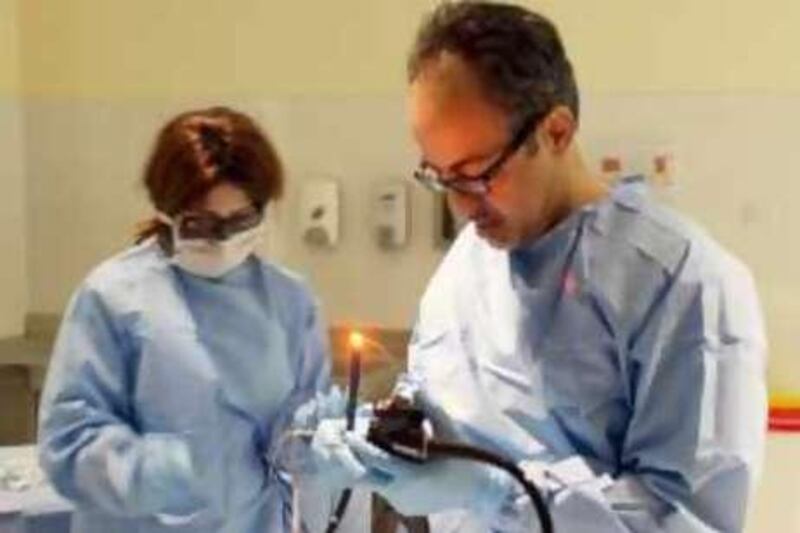ABU DHABI // The doctor who pioneered a groundbreaking treatment for stomach cancer in the UAE has warned that without a full screening programme it will never live up to its potential. Dr Emad al Rahmani, who performed the country's first endoscopic submucosal dissection at Mafraq Hospital last month, said the life-saving treatment would only help patients in the early stages of stomach cancer.
Dr al Rahmani, the chairman of medicine and head of gastroenterology and hepatology at the hospital, performed the surgery to remove a tumour from a patient's stomach. It is the first time such a procedure had been carried out in the Middle East. Dr al Rahmani said: "Usually, procedures to remove cancer from the stomach or intestines are done by cutting through the skin to reach the stomach, and then cutting the tumour out of the stomach, with part of the stomach's lining as well. We call this scar surgery."
In the new procedure, an endoscopic tube is threaded down the patient's throat, without any incision being necessary. Once doctors have located the tumour, they inject fluid beneath it, and then cut it out without damaging the outer stomach. Although the procedure is highly demanding - Dr al Rahmani described it as "very tedious" - it is much safer, faster and less painful for the patient, and can be carried out under local anaesthetic.
That made all the difference for Ibrahim, a 70-year-old Emirati man who is the first patient to undergo the new treatment. "My patient had too many health complications, and a history of strokes, which mean general anaesthesia is a huge risk," said Dr al Rahmani. Ibrahim's daughter, Aisha, 26, said: "When doctors noticed there was blood in my father's bowel movements, an endoscopy revealed a tumour in his stomach."
At that point, Ibrahim and his family faced an agonising choice between leaving the tumour to spread - causing increasing pain leading inevitably to death - or risk the new procedure. They opted to take the risk. "The entire procedure took barely 15 minutes," added Aisha. "Thank God we did it. He is completely free of cancer cells now." But Ibrahim was lucky, said Dr al Rahmani. Most such cancers were only diagnosed in the advanced stage. As he was already in hospital and undergoing regular check-ups, the cancer was identified early.
Any later, and the cancer may have spread to reach the outer wall of the stomach, making the new procedure redundant."The problem is that we do not detect cancer early in this country, because we don't have regular screening," said Dr al Rahmani. "When we detect cancer of the gastrointestinal tract here, it is by luck, like with this patient." Ibrahim will not require radiation or chemotherapy or further surgery; he is cancer free and will soon be discharged. Aisha added: "We took a risk. Some people would give up and say no when they know there is a danger, especially as he is in a coma. But we had a chance to get rid of the cancer so the advantage is great. I feel he is getting a bit better and with God's will, when he is in the familiarity of home with his family around him, he will improve more."
So far, only a few centres in the US, Germany, France and Japan are known to use this procedure. After lung cancer, stomach cancer is the second biggest cause of cancer-related death worldwide. In 2007, it accounted for 4.5 per cent of all cancers in the UAE, making it the sixth most common form of the disease after breast cancer, colorectal cancer, leukaemia, lung cancer and cancer of the lymph nodes.
@Email:hkhalaf@thenational.ae





